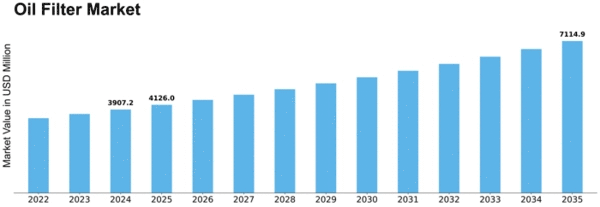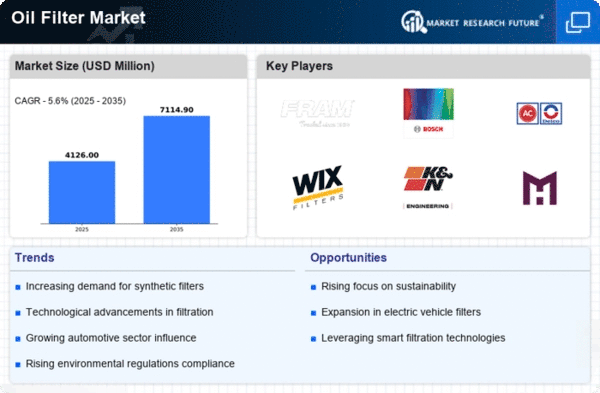Oil Filter Size
Oil Filter Market Growth Projections and Opportunities
The oil filter market operates within the broader automotive industry, playing a crucial role in ensuring the efficiency and longevity of vehicle engines. Market dynamics in this sector are influenced by various factors, reflecting a delicate balance between supply and demand, technological advancements, and environmental considerations.
Supply and demand dynamics play a pivotal role in shaping the oil filter market. As the global automotive industry continues to expand, with an increasing number of vehicles hitting the roads, the demand for oil filters rises in tandem. Original Equipment Manufacturers (OEMs) and aftermarket suppliers compete to meet this growing demand by offering a range of filters catering to diverse vehicle types and engine specifications. The competition, in turn, prompts innovations in filter design and materials, as manufacturers strive to differentiate their products and gain a competitive edge.
Technological advancements have become a driving force behind the evolution of the oil filter market. Manufacturers are investing in research and development to enhance filter efficiency, durability, and overall performance. Advanced filtration technologies, such as synthetic filter media and high-efficiency designs, are gaining prominence, offering improved contaminant removal and prolonged service life. Additionally, smart filters equipped with sensors and monitoring capabilities are emerging, allowing for real-time data collection on filter performance and engine health. This integration of technology not only addresses the growing complexity of modern engines but also aligns with the broader trend of digitalization within the automotive sector.
Environmental considerations are increasingly influencing market dynamics in the oil filter industry. Stricter emissions regulations and a growing emphasis on sustainability have led manufacturers to develop eco-friendly filter materials and disposal methods. The push for recyclable and biodegradable filter components aligns with the automotive industry's broader commitment to reducing its environmental footprint. Consequently, market players are not only focusing on the performance aspect but also on the ecological impact of their products, catering to environmentally conscious consumers and complying with regulatory requirements.
Global economic conditions and geopolitical factors also contribute to the market dynamics of oil filters. Fluctuations in oil prices can impact the overall cost of production, affecting both manufacturers and consumers. Political events and regional tensions can disrupt the supply chain, leading to fluctuations in raw material prices and potential shortages. The oil filter market, like other automotive components, is sensitive to such external factors, requiring stakeholders to adapt to changing circumstances and ensure a resilient and flexible supply chain.
In conclusion, the oil filter market is subject to a complex interplay of factors that shape its dynamics. Supply and demand, technological advancements, environmental considerations, and global economic conditions collectively influence how manufacturers and suppliers operate within this space. As the automotive industry continues to evolve, the oil filter market will likely witness further innovations, sustainability efforts, and adaptations to address the changing needs of vehicles and consumers alike. Understanding and navigating these dynamics is crucial for stakeholders in the oil filter market to stay competitive and contribute to the overall efficiency and sustainability of the automotive sector.



















Leave a Comment